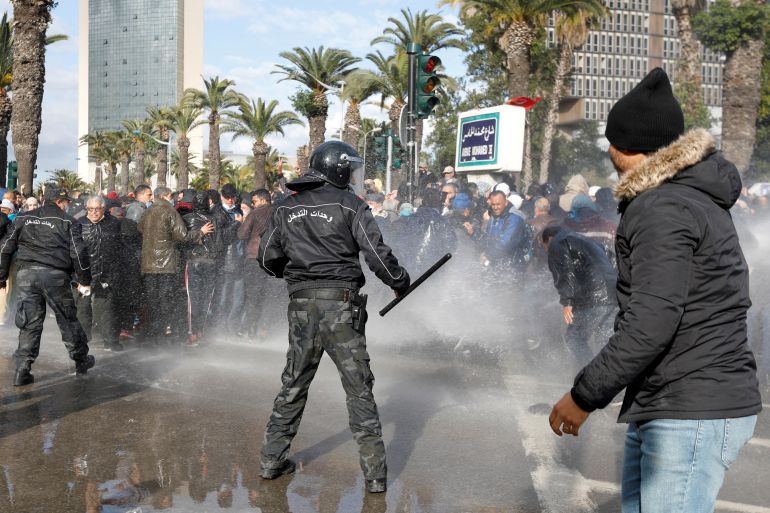Tunisian man died from police violence at protest: Opposition
The Ennahdha party said Ridha Bouziane, who was one of its members, was subjected to severe violence.

A Tunisian man has died in hospital from injuries inflicted by police, activists and the main opposition Ennahdha party said, in what would be the first death related to protests against President Kais Saied’s assumption of extra powers.
A Tunis court investigating the death said the man, found in a coma on Mohamed V Street in the capital, was taken to hospital on Friday and he died on Wednesday. A court statement made no mention of whether the man was one of the demonstrators.
Keep reading
list of 3 items‘Revolution in the making’: Tunisians demand return of democracy
Detained Tunisian politician hospitalised ‘in critical condition’
The court said the man’s body bore no visible signs of violence and would be handed to forensic examiners to determine the cause of death. An investigation had been opened, it added.
There was no immediate comment from the interior ministry.
The Ennahdha said in a statement, however, that Ridha Bouziane, who was one of its members, was subjected to severe violence, which resulted in severe bleeding in his brain.
Police used water cannon and batons against protesters on Friday, as Saied faced growing discontent over his suspension of parliament last July and subsequent rule by decree.
“Ridha Bouziane, who took part in the January 14 protest, died in a hospital in the capital after suffering serious injuries as a result of the excessive violence by police in the demonstration,” the Citizens Against the Coup coalition said.
Ennahdha said it holds President Saied and his interior minister fully responsible for Bouziane’s death and said it will prosecute those involved in the “crime”.
Samir Ben Amor, a lawyer for arrested protesters, also said Bouziane died due to police violence, though no more specifics were given.
Saied’s one-man mission to rebuild Tunisia’s broken political structures has sparked accusations that he is establishing a new dictatorship in the birthplace of the Arab Spring uprisings.
The envoys of seven Western countries plus the European Union last month urged Tunisia to respect “fundamental freedoms” and set a timeline for a return to democratic institutions.
Meanwhile, Tunisia’s economy remains affected by the pandemic, there has been little progress in gaining international support for the fragile public finances, and the government Saied appointed in September has announced an unpopular budget for 2022.
The Tunisian president started preparing a new constitution that he has said he will offer to a referendum in July.
The vote will take place following an online public consultation that will start in January. Parliamentary elections are also expected to take place at the end of 2022.